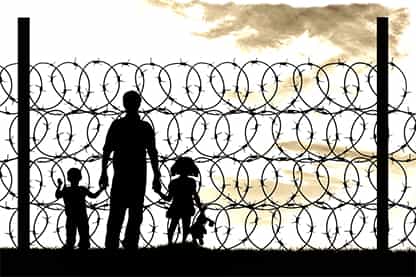A Global Perspective on the Crimes of Aggression
 A crime of aggression is committed when a political or military leader of a State causes the respective State to use force illegally against another State, provided that the force used constitutes a violation of the United Nations Charter in its character, gravity, and scale. The crime of aggression forms one of the four crimes over which the International Criminal Court’s (ICC) jurisdiction falls upon.
A crime of aggression is committed when a political or military leader of a State causes the respective State to use force illegally against another State, provided that the force used constitutes a violation of the United Nations Charter in its character, gravity, and scale. The crime of aggression forms one of the four crimes over which the International Criminal Court’s (ICC) jurisdiction falls upon.
The offense set out in Article 5 of the Rome Statute was suspended until the State Parties agreed upon a definition and its terms of application. This was successfully completed at the 2010 Kampala Review Conference and was formally adopted in the Assembly of State Parties in December 2017 to activate the Court’s jurisdiction over the crime of aggression in July 2018. Thus, marking its 20th anniversary, the ICC’s prosecutorial remit was extended, with effect on July 17, 2018, to include the crime of aggression.
In this article we examine the following:
- What constitutes a crime of aggression?
- What is the historical background to the persecution of the crime of aggression?
- What is the Jurisdiction and Procedure of the ICC?
Crimes of Aggression
An act of aggression, as defined under Article 8(2), means the use of armed force by a State against the sovereignty, political independence, or territorial integrity of another State, or in any other manner inconsistent with the United Nations Charter.
Article 8(1) of the Rome Statute defines a crime of aggression as where a person who is in a position of power to exercise effective control or direct the political or military action of a State and such person plans, prepares, initiates or executes an act of aggression which because of its character, gravity, and scale constitutes a violation of the United Nations Charter.
Regardless of a declaration of war, the following acts shall, in accordance with the UN General Assembly Resolution 3314 of December 1974, qualify as an act of aggression:
- Using the armed forces of a State to
- Invade or attack the territory of another State; or resulting military occupation, however temporary; or any annexation with the use of force on the territory of another State or part thereof;
- Bombard or use of weapons against the territory of another State;
- Blockade the ports or coasts of another State;
- Attack the land, sea or air forces including the air and marine fleets of another State;
- Where the armed forces of a State within the territory of another State on the agreement, and using such force in contravention of such agreement or an extension beyond its period of termination;
- The action of a State allowing the armed forces of another State to occupy its territory, in order to commit an act of aggression against a Third State;
- Where State sends armed bands, irregulars, groups, or mercenaries to carry out acts of armed violence against another State to such extent that it amounts to the acts listed above or substantial involvement in it.
Historical Background
Prior to World War I, Carl von Clausewitz described a mere continuation of state politics. This depicted the concept of war which was seen as an inherited right of the State. This concept was changed with the Peace Treaty of Versailles of 1919 which condemned war, an act of aggression, as a supreme offense which is against international morality and the sanctity of treaties. The Kellogg-Briand in 1928, condemned recourse to war for resolving international controversies and renounced it as an instrument of national policy for State interrelations.
Soon after World War II, the Nuremberg Tribunals, established by the London Charter, criminalized the act of waging a war of aggression. The General Assembly of the United Nations (UNGA) recognized the principles laid down in Nuremberg as international law. The Nuremberg principles were also used as a model for the Tokyo judgment in 1948.
The UNGA, through recognizing the London Charter as international law, discarded the notion that war-making was an inherent right of a State, rather, under certain circumstances, the act constituted an international crime.
Despite this development and the worldwide recognition that war needs to be condemned as an international crime, the crime of aggression is intertwined with other historical debates that remained unresolved within the field of international law, which proved to be impossible to define.
 Therefore, the definition of the crime of aggression was adopted by the UNGA in 1974 which, however, was riddled with anachronistic concepts established during the Cold War and undermined its normative significance. This was primarily because the definition was used as a strategic asset by the State who sought to control it in order to mobilize it to their benefit against their geopolitical opponents. As a result, the legacy of the Nuremberg Tribunal has left a dream unfulfilled with no other alleged preparators of the said crime being prosecuted since 1947. Despite this, the crime of aggression received recognition from scholars and participants in the Rome Conference in 1989 and was made a significant addition to the International Criminal Court’s jurisdiction ratione materiae.
Therefore, the definition of the crime of aggression was adopted by the UNGA in 1974 which, however, was riddled with anachronistic concepts established during the Cold War and undermined its normative significance. This was primarily because the definition was used as a strategic asset by the State who sought to control it in order to mobilize it to their benefit against their geopolitical opponents. As a result, the legacy of the Nuremberg Tribunal has left a dream unfulfilled with no other alleged preparators of the said crime being prosecuted since 1947. Despite this, the crime of aggression received recognition from scholars and participants in the Rome Conference in 1989 and was made a significant addition to the International Criminal Court’s jurisdiction ratione materiae.
The crime was recognized as one of the most serious crimes of concern to the international community under the Statute of Rome. However, this jurisdiction was precluded from being exercised by the ICC since the crime still remained undefined. A Special Working Group was established during the First Session of the Assembly of State Parties in 2002, with the duty to prepare a draft to address the main problems arising with the definition of the crime of aggression. The Special Working Group’s proposals on the crime of aggression were finalized in 2009 and eventually became the definition adopted at the Kampala Review Conference in 2010.
International Criminal Court’s Jurisdiction Over Crimes of Aggression
The International Criminal Court was created in 2002, with the aim to put an end to the immunity enjoyed by the preparators of the most severe crimes that plagued the international community as well as prevent the commission of such crimes in the future. The ICC has the jurisdiction to prosecute any individual anywhere in the world but to indict criminals who belong to a State which has not ratified the ICC Statute, a resolution from the United Nations Security Council is required.
- The extent of the Court’s Jurisdiction
Under Article 12 of the Rome Statute, and in accordance with the principle of jurisdiction ratione temporis (that is the temporal jurisdiction), the ICC can only investigate crimes committed after July 1, 2002, which is when the ICC Statute came into force.
The ICC has jurisdiction over a particular range of crimes such as genocide, war crimes, crimes against humanity and from 2018, the crime of aggression. The Preamble of the ICC Statute declares these crimes as serious crimes that threaten the security, peace, and well-being of the international community. However, the terms ‘peace’ and ‘justice’ have not been defined within the Preamble, which leads to different interpretations.
Article 15 provided the process to activate the Court’s jurisdiction as well as the procedure regarding the State Party’s referral, the ICC’s proprio moto authority (an action was taken without a formal request), and referral by the UN Security Council.
- Conditions for the Excercise of the Jurisdiction
The Rome Statute amendments enter into force for a State one year after the ratification or acceptance of such amendments by that State. However, the following two conditions must be met, to enable the Court to exercise its jurisdiction:
- The Court can only exercise its jurisdiction after a period of one year from the amendments being ratified by at least 20 RS State Parties; and
- After January 1, 2017, the Assembly of State Parties must take a decision by consensus or of at least 2/3 majority, to permit the Court to begin exercising the said jurisdiction.
Note: As of October 1, 2017, the State parties have ratified the amendments to the crime of aggression, and on July 17, 2018, the Court’s jurisdiction has been officially extended to include the crime of aggression. Thereby, upon fulfilling both conditions, the Court may exercise its jurisdiction subject to the following further requirements that need to be fulfilled.
- Situations Permitting ICC Excercise its Jurisdiction
- Prosecutor’s proprio motu investigations and State referrals under Article 15
In the case of State Party Referral, the Court will be able to exercise its jurisdiction only if the amendments have entered into force for at least one of the States involved with either the victim or the aggressor. If the Prosecutor determines that there is a reasonable basis to proceed with an investigation, then he shall notify the UN Secretary-General of the situation. The UNSC itself possesses the authority to determine the commission of an act of aggression as provided under Article 39 of the UN Charter. The Prosecutor shall allow the UNSC a period of six months to make the determination, and where the UNSC has made the determination that an act of aggression has been committed, the Prosecutor may proceed with the investigation. If the determination is not made in a period of six months, the Prosecutor may, with the authorization of the Pre-Trial Chamber, still proceed with the investigation. Similar conditions apply in the case of an investigation initiated by the Prosecutor on his own motion (proprio motu).
- UNSC referrals under Article 15
If the Security Council refers a situation to the ICC under the powers provided under Chapter VII of the UN Charter, the Prosecutor has the power to investigate any of the four core crimes (under Article 5) committed in any territory by any state’s national.
Under such a situation, the Court is able to extend its jurisdiction over crimes of aggression involving non-State parties and State Parties, irrespective of their individual ratification or opt-out status.
- Exclusions from ICC's Jurisdiction
- State Parties have the option to opt-out of the jurisdiction of the Court over crimes of aggression when exercised through state referral or proprio motu powers of the Prosecutor, by submitting a declaration to that end with the Registrar of the Court. Such declaration must be submitted before the commission of the act of aggression.
- Nationals of non-state parties to the Rome Statute are excluded from the jurisdiction of the ICC over the crime of aggression when it is initiated by the use of proprio motu powers or by state referral, even if the victim state has accepted the jurisdiction.
However, if the referrals are made by the UNSC, then the Court is able to exercise the jurisdiction over nationals of State and non-state parties over the crimes of aggression committed within its territories or by its nationals.
Drawbacks of the Definition
 The current definition seems focused only on old wars, where state sovereignty and action played a decisive role in the act of aggression. State actors are continuously becoming of less importance for the use of force since the weakening of the capacity of the state to make unilateral use of force on other states has been greatly weakened by the growing destructiveness of the military technology and the interconnectedness of the state.
The current definition seems focused only on old wars, where state sovereignty and action played a decisive role in the act of aggression. State actors are continuously becoming of less importance for the use of force since the weakening of the capacity of the state to make unilateral use of force on other states has been greatly weakened by the growing destructiveness of the military technology and the interconnectedness of the state.
Another drawback is that the definition fails to capture weapons and aggressors beyond the states that increasingly commit the act of aggression nowadays.
Furthermore, the list of actions classified as an act of aggression seems to be outdated since new modes of warfare which do not necessarily involve the state armed forces is a characteristic of modern warfare. Hence, the current definition cannot be applied to the present reality of armed conflicts, enabling the non-state actors to carry out the aggressive use of force without the fear of any international judicial consequence.
While inter-state wars are diminishing, there is a growing amount of ‘new wars’ which differ from the old wars in three aspects: their goals, source of finance and modes of warfare. New wars are based on identity politics which are focused on the claim to power on the basis of a particular identity. Further, combat units find their own funding through hostage-taking, plunder, black-market trading, or through external assistance. This raises a new aspect of the crime of aggression, where force is used for the purpose of individual gain. Finally, new wars unlike old wars, whose strategic goals are to mobilize extremist politics grounded in fear and hatred, attempt to control the population of the society by cleansing everyone of a different identity or by instilling the fear or terror.
Considering all the above points, the current exclusive focus of the definition of the crime of aggression would not only obstruct the objective of the State Parties to prevent suffering caused by armed conflict but also thwarts the ability of the ICC to achieve its objectives to prevent the commission of a crime and promote peace.
Conclusion
The primary aim of the International Criminal Court is to promote not only justice but also peace. There has been extensive criticism on the ICC for doing neither; however, the ICC also struggles with some severe political and structural difficulties. On the one hand, it has limited resources and faces institutional restrictions, and on the other, it is manipulated by the states. The ICC is also criticized for alleged selectivity in dispensing justice. Despite all this, the ICC could be a beacon to promote international justice and peace, preventing the commission of a crime since its prosecutions present a clear threat to those individuals who commit serious crimes. It is argued that the contribution of the ICC, in the broader international context, to international peace and justice depends on the institutional power and support it receives from the states and in its own impartial work.
 English
English
 عربي
عربي Русский
Русский 官话
官话 português
português
 Türk
Türk 























